Peter emerges from his tent in the morning to see Oreius passing by. Oreius motions with his head to where Aslan and Edmund stand on a rock in conversation. The book says that “There is no need to tell you (and no one ever heard) what Aslan was saying, but it was a conversation which Edmund never forgot.” You might expect this movie with its emphasis on character journeys to want to dramatize such an important moment in Edmund’s development. But, no, they stay true to the source material, leaving it ambiguous what is being said and whether Aslan was more stern or more compassionate. And while it may not make sense in theory to refrain from dramatizing it further, I think it works beautifully in practice.
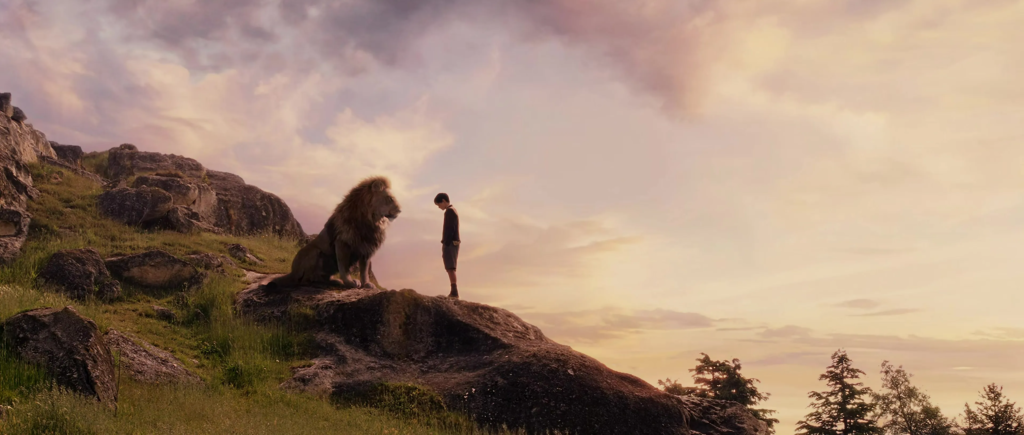
Susan and Lucy emerge from their own tent. Lucy sees Edmund, calls his name and starts to run towards him but Peter holds her back out of respect for the privacy of this moment. Edmund hears Lucy’s voice however and Aslan gives him a stern nod. The two of them slowly walk toward the other Pevensie children. I appreciate how the movie slows down and really gives this scene some gravitas. You really feel Edmund’s shame and awkwardness as well as the mixed emotions of his brother and sisters. The quiet music is also beautiful.
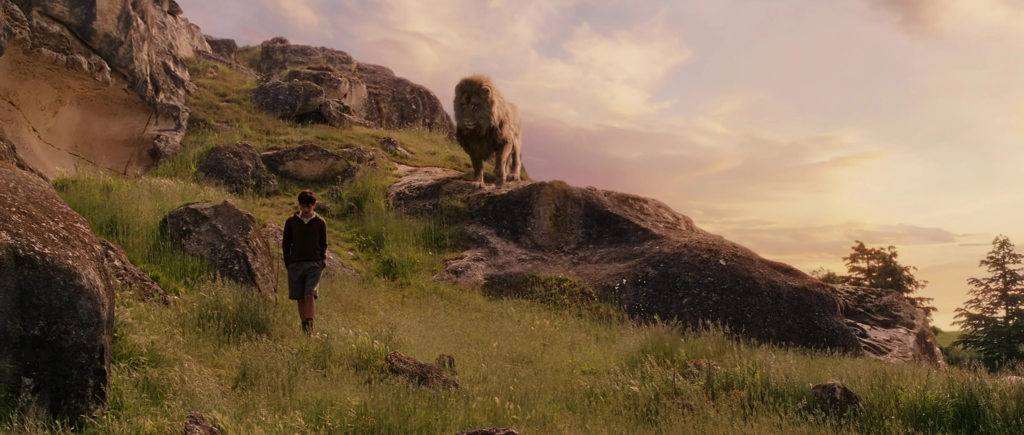
“What’s done is done,” says Aslan, “There is no need to speak to Edmund about what is past.” He leaves them alone. Edmund has a hard time at first meeting anyone’s eyes. With an effort, he blurts out a “hello.” Lucy runs over and gives him a hug which he returns. Susan puts a hand on his shoulder and gives him a gentler hug once Lucy’s is done. Peter’s expression is still somewhat lacking in friendliness. It’s unclear whether he wants to hug Edmund too or strangle him.
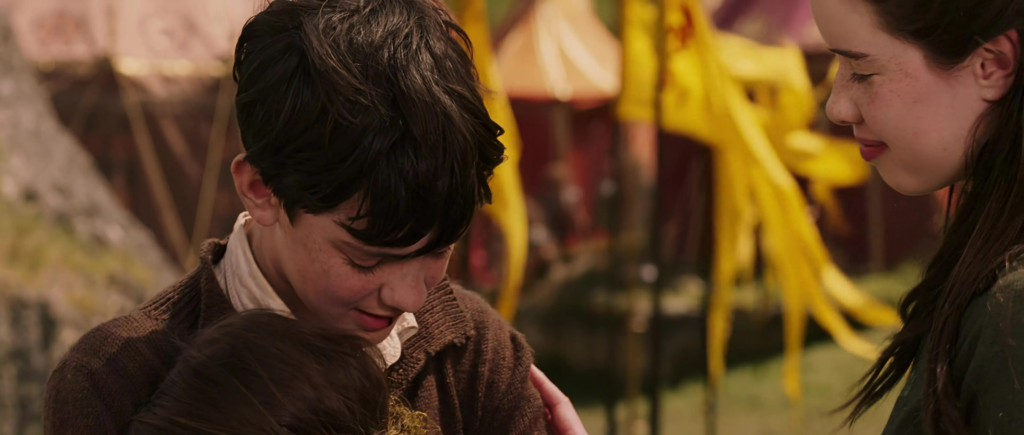
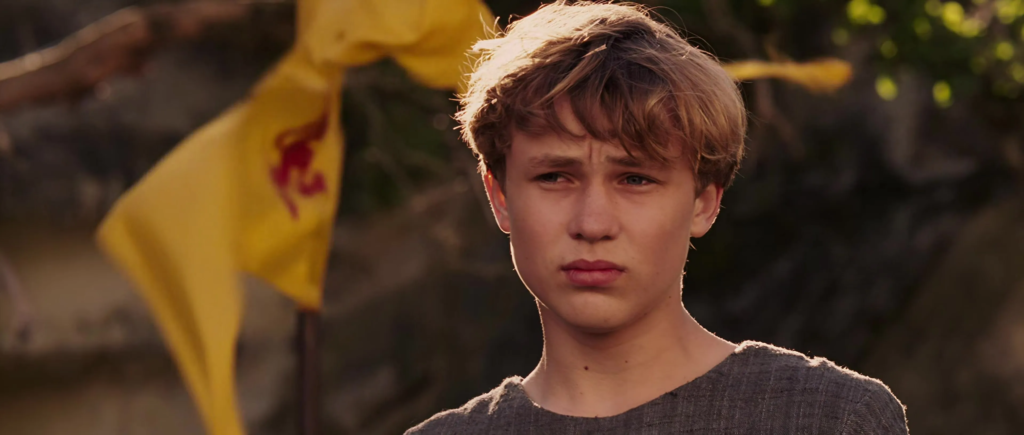
Susan asks Ed if he’s alright and he says that he’s a little tired, doubtless something of an understatement. “Get some sleep,” says Peter, a little curtly. Edmund starts to walk away, looking as if he wished for a warmer reception from his brother. On impulse, Peter calls after him, “And Edmund-” For a moment, it seems that Peter is going to pour out his heart, but he reconsiders and simply says, “try not to wander off.” That line could easily have come across as a rebuke. Indeed, in the earlier version of the script, that’s exactly what it was. But here it plays as friendly banter. The fact that Peter comes feels comfortable enough to joke about Edmund’s betrayal with him really shows that all his forgiven between the two.
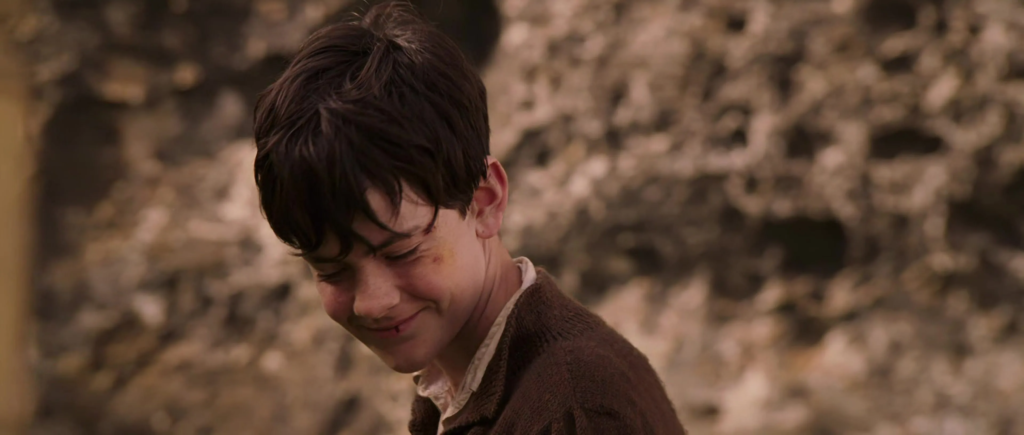
After Edmund’s gone, Peter’s smile fades though. That may be less because of his feelings about Edmund himself however than it is about his worries over something else.
At a first glance, this movie seems much faster paced than the book that inspired it. That’s because the book is largely devoted to the scenes of characters walking and eating.[1]I don’t mean that as a criticism! It’s how C. S. Lewis himself described the books he wrote, walking and eating being some of his favorite pastimes. But this impression is something of an illusion. It’s right at this point in the book, when “everyone wanted very hard to say something which would make it quite clear that they were all friends with him again-something ordinary and natural-and of course no one could think of anything in the world to say,” that the White Witch requests a meeting with Aslan. The movie actually adds a scene or two, one of them a dialogue scene, in between. It’s not so much that the movie is fast paced, and the book slow paced as it is that they have different interests.
The Pevensies have a picnic. Edmund, how dressed in Narnian clothes, wolfs down bread and cheese, understandably starving. Peter says he’s sure the Narnians will pack plenty of food for the journey back. “We’re going home?” asks Susan incredulously. Up until now, she’s been the one insisting that they all return to their own world. But now when that seems about to happen, she sounds disappointed, which is strangely convincing. Peter says he’s sending his siblings back since he promised their mother he’d keep them safe, but he intends to stay and help Aslan’s army. “But they need us,” says Lucy, “all four of us!” Peter argues that it’s too dangerous. “You almost drowned,” he reminds her, “Edmund was almost killed!” To the others’ surprise, Edmund interjects that that is why they have to stay. (Presumably, he’s referring to the circumstances around his near demise, not Lucy’s.) “I’ve seen what the White Witch can do,” he says, “And I’ve helped her do it. But we can’t leave these people behind to suffer for it.” Lucy wordlessly grips his hand. There’s a moment of silence. Now I’m a pretty individualistic loner-type for whom the military holds no appeal, so the fact that the movie was able to move me with the Pevensies deciding to risk their lives to help a country means it deserves some kind of medal!
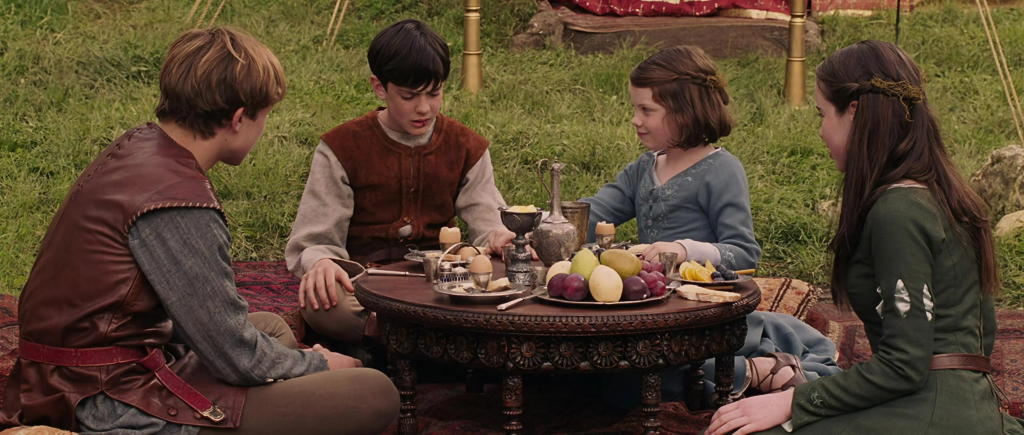
“I suppose that’s it then,” Susan says calmly. She rises from the table and walks away. “Where are you going?” asks Peter. “To get in some practice,” she says with a smile, picking up her bow and arrows. Fans of the original book and of the character of Aslan in particular may reasonably criticize this adaptation for emphasizing the role of the Pevensies at his expense but it’s worth noting that Edmund, Susan and Peter all show major character growth here, for seemingly no other reason than meeting him.[2]Of course, a viewer less enchanted with the movie than I might say that’s an example of badly structured character arcs. That should count for something. We get a brief scene of Susan practicing her archery on a field a bit removed from the camp. Amusingly, Lucy also practices throwing her dagger and turns out to have a better aim than her older sister. Peter and Edmund are also practicing riding on horses and sword fighting. The book, by the way, never depicted them training for battle at all. You could argue that by adding this bit, the movie makes their survival a tad more realistic. You could also argue that it’s still unrealistic and by trying to make it less so, the movie actually draws attention to the implausibility. But I won’t make that case.
Mr. Beaver comes running across the field, scaring Edmund’s horse who neighs and rears. “Whoa, Horsie!” says Edmund. “My name is Philip,” says the horse (in the voice of production manager Philip Steuer.) “Oh, sorry,” says an embarrassed Edmund. The moment is worth a chuckle but it’s actually one of the parts of the movie that annoys me most as a fan of the Narnia books, which state emphatically that talking horses are not to be ridden or used as beasts of burden.[3]Also, the name Philip does not sound at all like the horse names in The Horse and his Boy. It’s true that The Lion, the Witch and the Wardrobe itself doesn’t mention this but this movie has already shown signs that the screenwriters skimmed the other books in the series at least and we’ll see more signs later. It would have been nice if they could have remembered that rule. It may be a little thing but it’s something that stands out about the Narnia books. As a fan of those, I want to watch these movie adaptations and imagine that I’m seeing the world of Narnia come to life before my eyes. The absence of the no-riding-talking-horses rule makes this movie’s world feel less like Narnia to me. It’s also worth noting that in the final book in the series, The Last Battle, seeing a talking horse be treated like a dumb animal so infuriates the good guys that they gruesomely kill the perpetrators without giving them a chance to defend themselves.[4]The Last Battle is somewhat darker than the average Narnia story. Had the movie series been able to adapt that book, it wouldn’t have been impossible for them to make that plot point work. After all, the horse wasn’t just being ridden but whipped and abused. But it would be a lot easier to sell if they established that talking horses should be differently from regular horses right from the start.
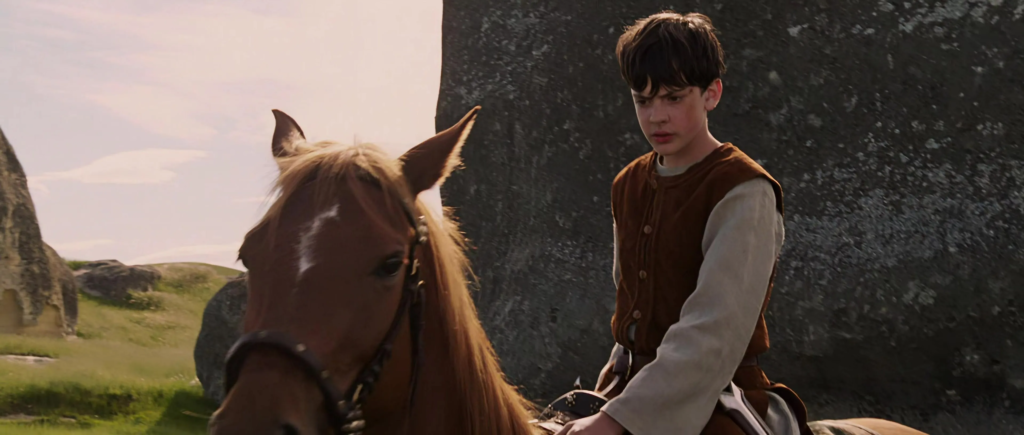
To be fair, the books do give an exception to the rule: “in war where everyone must do what he can do best.” Training Edmund for battle could technically count as that with some generosity. By the way, Peter’s horse is actually a unicorn, something that also isn’t supposed to be ridden in Narnia. The Last Battle also depicts unicorns as talking, something Peter’s unicorn never does. Technically, that makes it even less accurate to the book series but if they had to have the first inaccuracy, I’d rather they do the second since it actually makes the first less annoying. I know there are people out there who would laugh at me devoting so many words to this little moment, but their laughter doesn’t alter my opinion. Tiny moments in an adaptation can be what make fans of the original cheer the most and they can nag like mosquitoes.
Anyway, back to the story. Mr. Beaver tells the boys that the White Witch has demanded a meeting with Aslan. We cut to the Witch being carried into the camp in a portable throne by cyclopses. There are no cyclopses among the Witch’s followers in the book, but they fit. Ginarrbrik goes before the litter, crying, “Jadis, Queen of Narnia and Empress of the Lone Islands!” Those Lone Islands are mentioned briefly in C. S. Lewis’s The Lion, the Witch and the Wardrobe but aren’t really relevant until The Voyage of the Dawn Treader.[5]For that matter, the Witch’s first name, Jadis, is also mentioned once in the book and only becomes relevant much later in the series. The fact that the movie gave them a shoutout even though they didn’t need to do so makes me happy. See? Little details can make or break an adaptation. If I weren’t bothered by Edmund riding a talking horse, I couldn’t enjoy the mention of irrelevant islands and be consistent.
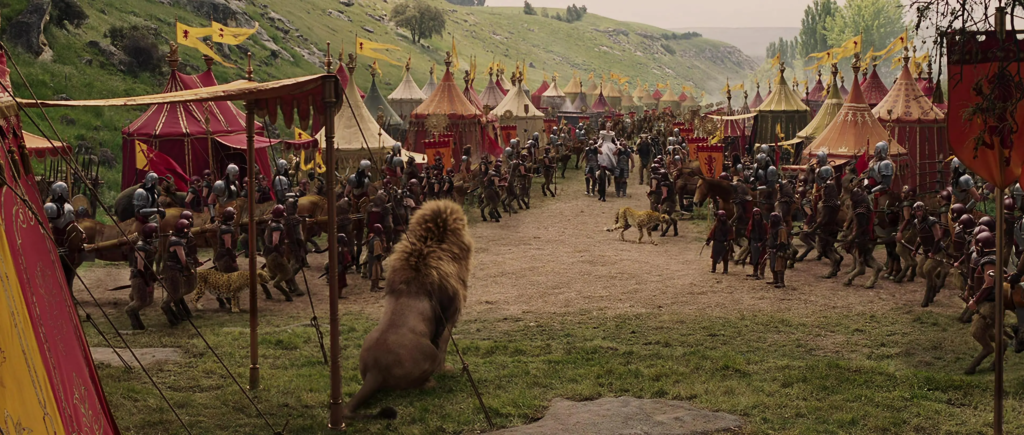
Aslan’s soldiers boo the Witch and her entourage as they approach Aslan’s tent. In the book, while Aslan and the Witch are described as the only ones who seem totally at their ease in this scene, it’s also implied that the Witch is still intimidated by Aslan. We get a closeup of his face and then a closeup of her face which can be interpreted as her being nervous but could just as easily not be interpreted that way. As much as I’ve praised Tilda Swinton’s aloof performance, there is a danger with aloof characters. It can be hard to tell what they’re feeling.
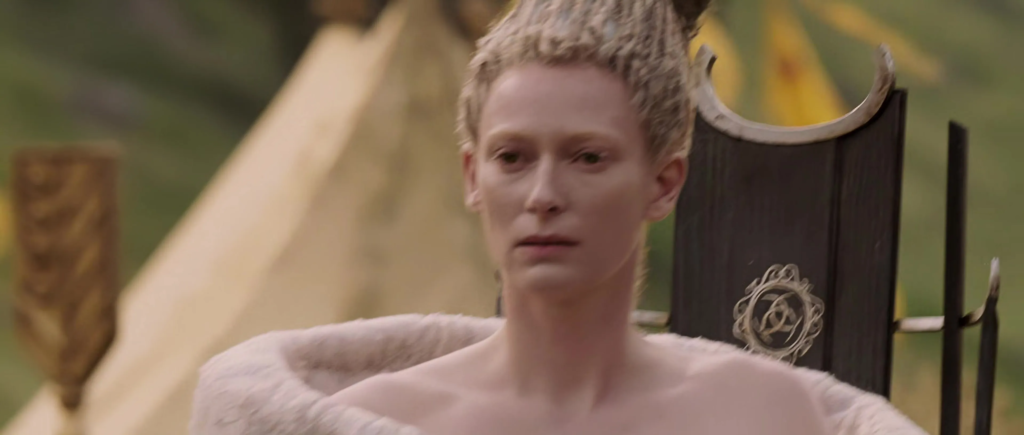
As the Witch alights from her litter, she makes eye contact with Edmund before turning her attention to Aslan.
Witch: You have a traitor in your midst, Aslan.
Aslan: His offense was not against you.
Witch: Have you forgotten the laws upon which Narnia was built?
Aslan (snarling): Do not cite the Deep Magic to me, Witch! I was there when it was written.
Witch: Then you’ll remember well that every traitor belongs to me. His blood is my property.
In the book, Aslan comes across as more relaxed and seems to be toying with the Witch. His initial response to her first words is “well, his offense was not against you.” That one word, “well,” makes his tone more casual, humorous even, and less defensive than it is in the movie. When the Witch accuses him of forgetting the Deep Magic, he says, “Let us say I have forgotten it. Tell us of this Deep Magic.” Presumably, the filmmakers didn’t want Aslan to seem too in control for fear the scene would lose tension. (When Aslan rebukes her, the Witch actually seems a little triumphant at having gotten a rise out of the lion.) As we’ll see with the battle between Aslan’s army and the Witch’s, they also really wanted this to be an underdog story. Personally, I think having Aslan be totally calm, on the surface anyway, is more interesting and I actually think it could have heightened the suspense by making viewers worry that he might be overplaying his hand. Oh well.
In response to the Witch claiming Edmund’s blood, Peter draws his sword. “Try and take him then,” he says. In the book, that line[6]Well, actually, the line is “come and take it then” in the book but never mind. is actually said by a bull with a man’s head.[7]Not to be confused with a man with a bull’s head. I think transferring it to Peter is a good way of confirming that the brothers are reconciled. The White Witch gives Peter a condescending look. “Do you really think that mere force will deny me my right, little king?” she says. “Aslan knows that unless I have blood as the law demands, all of Narnia will be overturned and perish in fire and water. That boy will die on the Stone Table as is tradition! You dare not refuse me.” Edmund looks devastated by this news as you’d expect. His emotions are a bit more complex in the book.
He felt a choking feeling and wondered if he ought to say something; but a moment later he felt that he was not expected to do anything except to wait, and do what he was told.
I think that’s more interesting than what the film does but it probably would have come across as bad acting so changing it was the right call. Actually, you could argue that Edmund’s reaction is true to the book in that he’s disturbed but refrains from saying anything.
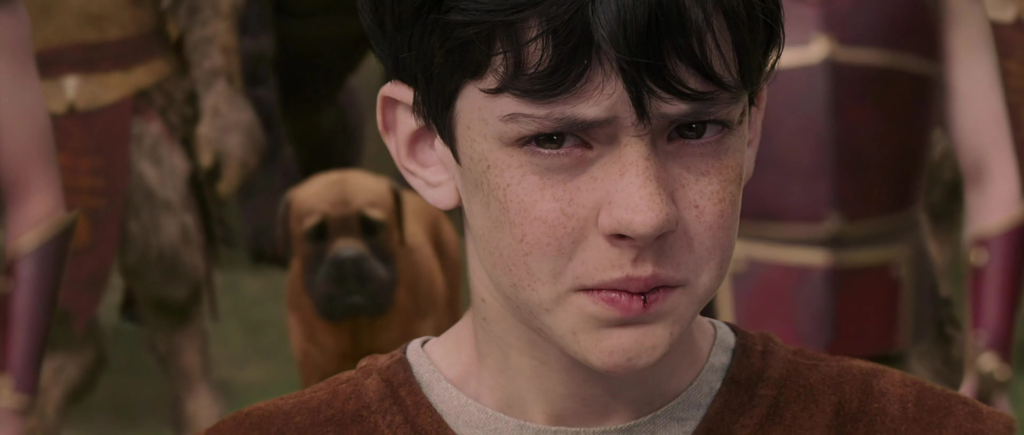
In the book, by the way, we learn a little more about this mysterious Deep Magic/law but not much more. It was apparently created by Aslan’s father, the Emperor beyond the Sea, and is engraved on his scepter. That really raises more questions than it answers though. This Emperor is mentioned in a couple of the books, mostly prominently in this, The Lion, the Witch and the Wardrobe, but never appears or receives much more than a mention, so I think it was reasonable for this adaptation to drop him.[8]From a Christian theological perspective, the Emperor corresponds to God the Father and Aslan corresponds to God the Son. However, this is never really developed and in The Magician’s Nephew, … Continue reading Anyway, Aslan says he’ll talk with the Witch in private and leads her into his tent. We cut to sometime later as the Pevensies and the rest of Aslan’s followers are waiting for a verdict. The movie does a good job of capturing the book’s description of this scene with even small background noises being prominent in the nervous silence.
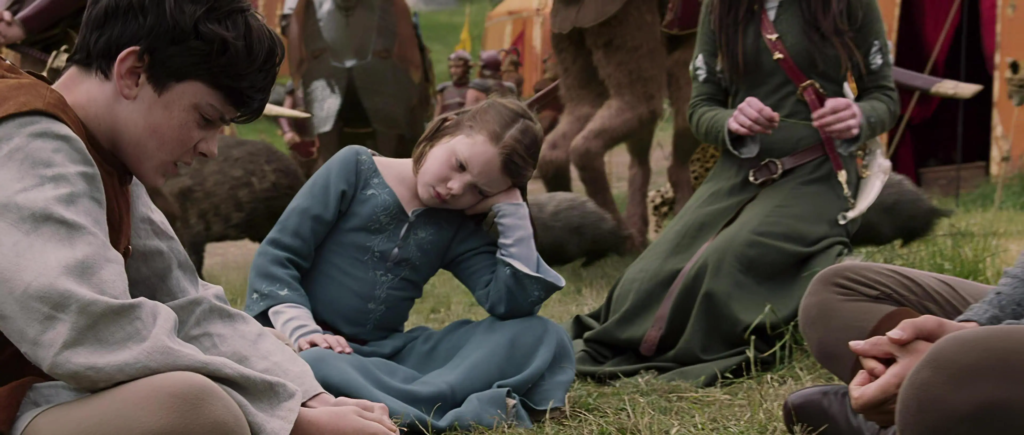
Everyone’s attention turns to the tent as the Witch emerges, followed by Aslan. She gives Edmund a piercing look. Aslan’s head is bowed, and it really feels as if he’s about to admit defeat. But then he says, “She has renounced her claim on the Son of Adam’s blood.” The scene is kind of brilliant. It fools you into thinking Aslan is going to say the opposite of what he does without him or the Witch doing anything that doesn’t make sense. That is to say, it doesn’t make sense now, but it will once we know all as we will shortly. “How do I know your promise will be kept?” demands the Witch. Aslan roars at her. When he did that in the book, “the Witch, after staring for a moment with her lips wide apart, picked up her skirts and fairly ran for her life.” Here she just sits down, looking scared, which manages to be less lame than you’d imagine. It’s perfectly valid for book fans to criticize the adaptation for not having the Witch be scared of Aslan enough but the filmmakers must have wanted her to be somewhat scared of him or they wouldn’t have included this moment at all.
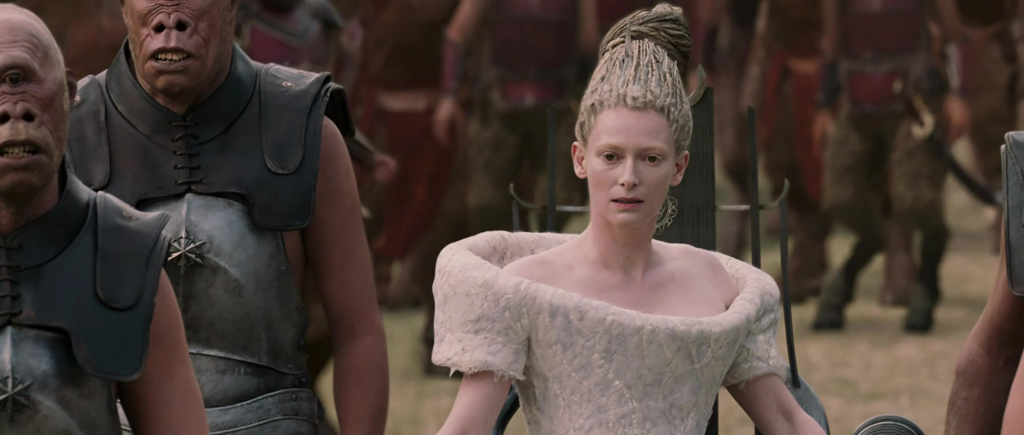
Nevertheless, as her bearers carry her away, the Witch looks over her shoulder at Aslan with an I’ll-Get-You-For-This expression. Everyone is clapping Edmund on the back and congratulating him and his brother and sisters. Lucy looks over at Aslan, expecting him to be rejoicing too. But instead, he bows his head and, with a brief, sad glance at her, goes back into his tent. Lucy is disturbed by this quickly gets caught up again in the celebration. No moment like this is described in the book but Lucy and Aslan have a very close relationship in later installments of the series[9]According to Prince Caspian, she “understood some of his moods.”, so this feels very consistent with that.
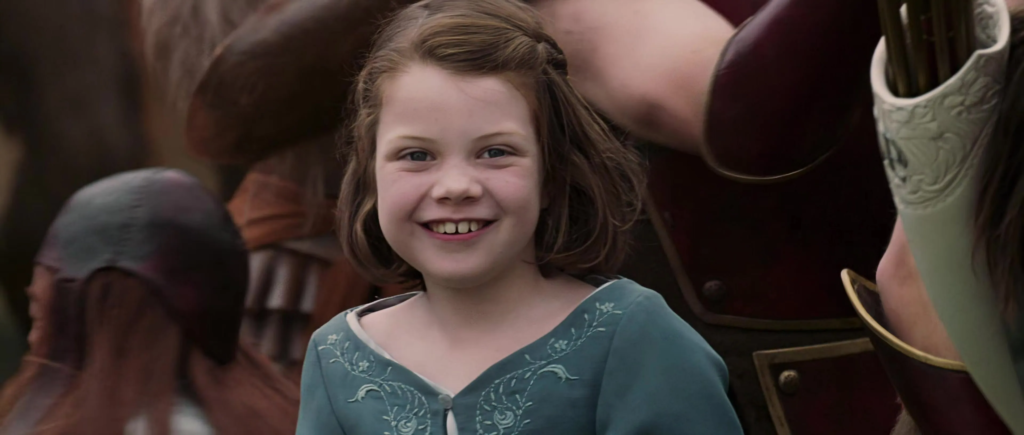
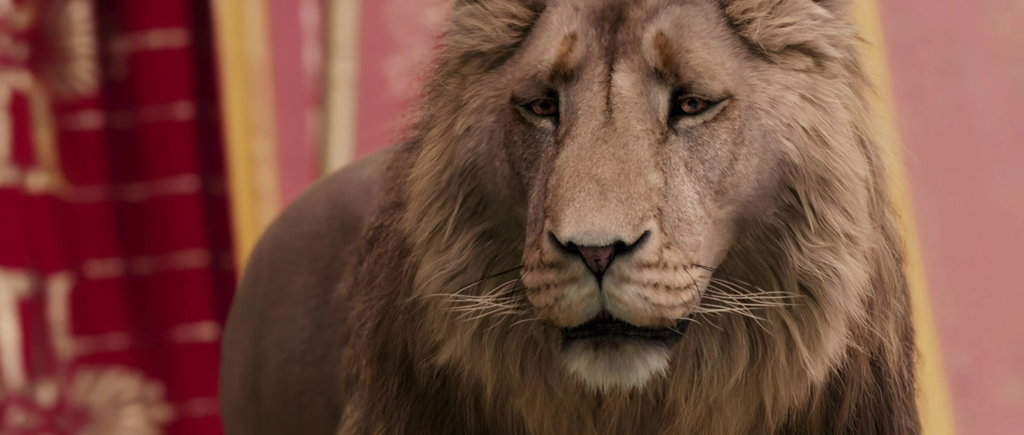
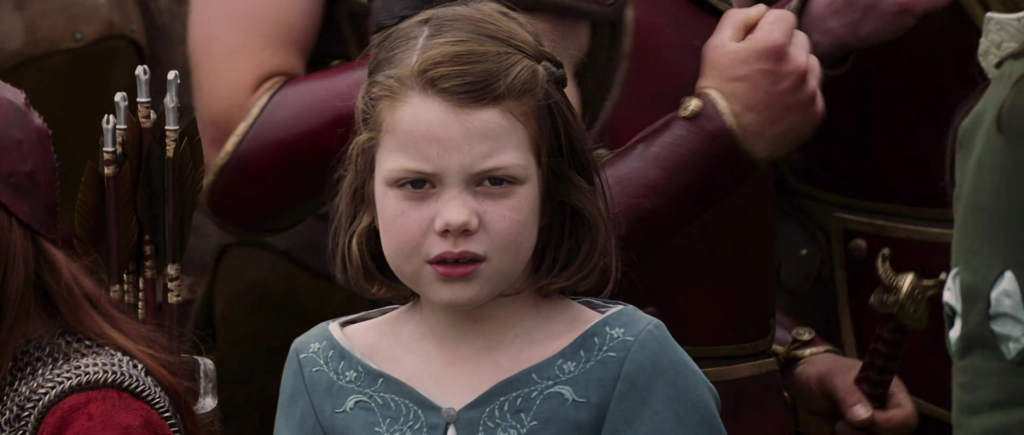
Next Week: So… What’s This Promise Aslan Has to Keep Now?
References
| ↑1 | I don’t mean that as a criticism! It’s how C. S. Lewis himself described the books he wrote, walking and eating being some of his favorite pastimes. |
|---|---|
| ↑2 | Of course, a viewer less enchanted with the movie than I might say that’s an example of badly structured character arcs. |
| ↑3 | Also, the name Philip does not sound at all like the horse names in The Horse and his Boy. |
| ↑4 | The Last Battle is somewhat darker than the average Narnia story. |
| ↑5 | For that matter, the Witch’s first name, Jadis, is also mentioned once in the book and only becomes relevant much later in the series. |
| ↑6 | Well, actually, the line is “come and take it then” in the book but never mind. |
| ↑7 | Not to be confused with a man with a bull’s head. |
| ↑8 | From a Christian theological perspective, the Emperor corresponds to God the Father and Aslan corresponds to God the Son. However, this is never really developed and in The Magician’s Nephew, Aslan fills God the Father’s role of Creator. |
| ↑9 | According to Prince Caspian, she “understood some of his moods.” |

I also dislike the fact that Edmund is riding a talking horse and one with reins and a saddle(unlike Shasta from the other book). It’s even more annoying at the end when chasing the white stag and Phillip complains of being old and tired.